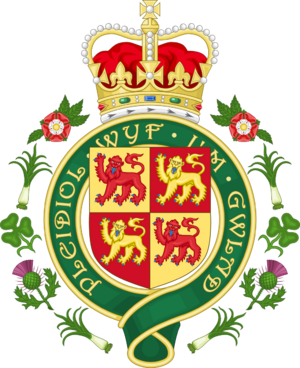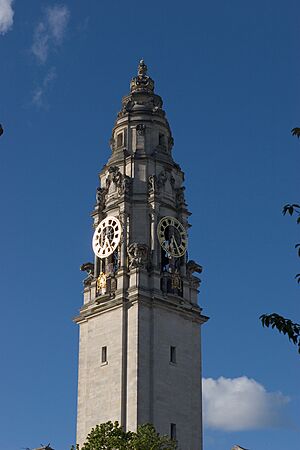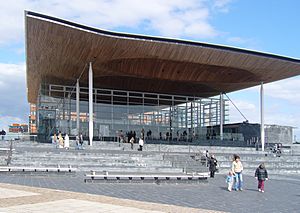Politics of Wales facts for kids
Wales is one of the four countries that make up the United Kingdom (UK). The way Wales is governed is unique and is called its "politics."
The UK is officially a single country with one main government and parliament in London. However, in the late 1990s, Wales, Scotland, and Northern Ireland voted for a system called devolution. This means they got some power to govern themselves. The UK Parliament in Westminster can still change or even remove these powers, so the Welsh Parliament isn't fully independent.
The main power to make decisions in the UK belongs to the King or Queen and the UK Parliament. But with devolution, some of these powers have been given to the Welsh Parliament, known as the Senedd. This started with the Government of Wales Act 1998 and was expanded further in 2006.
Contents
How Wales is Governed
Since 1998, Wales has its own government. This includes the Welsh Parliament and the Welsh Government.
Even with its own government, Wales still shares a legal system with England. However, the Welsh Parliament can create its own laws for Wales. Before 1998, Wales didn't have its own separate government. Decisions were made by the UK Government, with a special office called the Welsh Office handling Welsh matters.
How Welsh Politics Grew
For a long time after the 1500s, Wales was treated legally as part of England. But over time, people in Wales started to feel that Wales should have its own distinct identity and laws.
In 1881, the first law made only for Wales was passed. Later, special Welsh departments were set up for education and agriculture. Even though some political movements for Welsh self-rule didn't succeed, important Welsh institutions like the National Eisteddfod (a cultural festival), the University of Wales, and the National Library of Wales were created.
After the Second World War, the UK government started to give more attention to Wales. A special council was set up to advise the government on Welsh issues. In 1951, a Minister of Welsh Affairs was appointed. Cardiff was named the capital city of Wales in 1955.
A big moment was in 1956 when a valley called Capel Celyn was flooded to create a reservoir for England, even though most Welsh people were against it. This made many people in Wales feel powerless and increased support for Welsh nationalism.
In 1964, the Welsh Office was created, led by a Secretary of State for Wales. This office gained more powers over health, agriculture, and education in Wales. This was a big step towards Wales having its own administration.
Later, in 1997, the idea of devolution came back. After a close vote in a referendum, the National Assembly for Wales was created in 1999. Its powers were increased in 2007, allowing it to make more of its own laws. After this, the role of the Secretary of State for Wales became much smaller.
The Senedd

The Senedd (also known as the National Assembly for Wales) is the elected body that makes laws for Wales. Its main building is also called the Senedd. Both English and Welsh are used equally in the Senedd.
The Senedd was set up in 1999 after people in Wales voted for it in a referendum in 1997. Many groups supported this, including the Welsh Labour Party, Plaid Cymru, and the Liberal Democrats. The Conservative Party was the only major party in Wales that was against it.
The Senedd has 60 elected members, called Assembly Members (AMs). The person in charge of the Senedd is called the Presiding Officer.
The Senedd has the power to make laws for Wales. While it doesn't have the power to change taxes directly, it can make decisions about charges for public services. For example:
- NHS Prescriptions: Prescriptions are free in Wales, unlike in England where you still pay.
- University Tuition Fees: Students from Wales studying at Welsh universities pay different fees compared to students from other parts of the UK.
- Residential Care: Wales has a different system for paying for nursing care, which means more people get help from the government.
These differences show how the Senedd can make decisions that affect people's daily lives in Wales. The Senedd has fewer law-making powers than the Scottish Parliament or the Northern Ireland Assembly because Wales has had a legal system more similar to England's for a longer time.
The Welsh Government
The Welsh Government is the part of the Senedd that puts laws into action and manages public services. It is made up of the First Minister of Wales and their team of ministers.
After the 2011 election, the Welsh Labour Party formed a government. The First Minister is the leader of the Welsh Government.
First Minister
- Carwyn Jones AM (Labour)
Some Welsh Ministers
- Ken Skates AM, Cabinet Secretary for Economy and Infrastructure (Labour)
- Vaughan Gething AM, Cabinet Secretary for Health, Well-being and Sport (Labour)
- Kirsty Williams AM, Cabinet Secretary for Education (Liberal Democrat)
Before 2007, the Welsh Government didn't have its own separate legal powers. It acted as a committee of the Senedd. But the Government of Wales Act 2006 changed this, giving Welsh Ministers their own authority to make decisions.
Political Parties in Wales
For a long time in the 1800s, the Liberal Party was very strong in Wales. But since the early 1900s, the Labour Party has been the most popular. They usually win the most votes in elections in Wales. Labour is strongest in industrial areas like the South Wales Valleys and cities like Cardiff and Swansea.
The Welsh Conservative Party has often been the second biggest party. However, they sometimes don't win many seats in Wales.
Plaid Cymru is the main Welsh nationalist party. They want more self-government for Wales. The party was formed in 1925. They are strongest in rural areas where more people speak Welsh.
The Welsh Liberal Democrats are part of the UK Liberal Democrats. They usually get good support in rural mid and west Wales.
Current Party Representation
style="width: 2px; background-color: #E4003B;" data-sort-value="Labour Party (UK)" | style="width: 2px; background-color: #0087DC;" data-sort-value="Conservative Party (UK)" | style="width: 2px; background-color: #005B54;" data-sort-value="Plaid Cymru" | style="width: 2px; background-color: #FAA61A;" data-sort-value="Liberal Democrats" | style="width: 2px; background-color: #70147A;" data-sort-value="United Kingdom Independence Party" |
| Party | MPs (UK Parliament) | AMs (Welsh Parliament) | |
|---|---|---|---|
| Labour | 25 of 40 | 29 of 60 | |
| Conservative | 11 of 40 | 11 of 60 | |
| Plaid Cymru | 3 of 40 | 12 of 60 | |
| Liberal Democrats | 1 of 40 | 1 of 60 | |
| UKIP | 0 of 40 | 7 of 60 | |
Welsh Politics Since Devolution
Since 1999, Labour has won the most votes in Senedd elections and has always been part of the government in Wales. They have often formed governments with other parties, like the Liberal Democrats or Plaid Cymru.
One big difference between Wales and England is how public services are run. Welsh governments have not followed some of the market-based changes introduced in England. For example, former First Minister Rhodri Morgan talked about creating services that are free for everyone to use, like free prescriptions and free school breakfasts.
Local Politics

For local government, Wales is divided into 22 areas. These local councils are in charge of services like education, social work, and roads. The smallest level of local government is the community council.
Welsh Law Today
Since the 1500s, Wales has shared a single legal system with England. This means that "England and Wales" is often treated as one legal area.
However, the Welsh Parliament now has the power to make specific laws for Wales.
How Wales Works with Other Countries
Wales's foreign policy is handled by the UK Government, as it is part of the United Kingdom. This includes relations with the European Union.
Relations with America
Even though the UK government handles foreign affairs, the Welsh Government has its own representatives in America. Their main job is to promote business interests for Wales. The main Welsh Government office in the US is inside the British Embassy in Washington, D.C., with smaller offices in other major cities.
American politicians have also formed a group to build direct connections with Wales.
| House of Representatives | ||
| Representative | Party | State |
|---|---|---|
| Morgan Griffith | Republican | Virginia |
| Kenny Marchant | Republican | Texas |
| Ted Lieu | Democratic | California |
| Doug Lamborn | Republican | Colorado |
| Jeff Miller | Republican | Florida |
| Keith Rothfus | Republican | Pennsylvania |
| Bob Goodlatte | Republican | Virginia |
| Charles W. Dent | Republican | Pennsylvania |
| Roger Williams | Republican | Texas |
| Senate | ||
| Senator | Party | State |
| Joe Manchin | Democratic | West Virginia |
| Executive Branch | ||
| Secretary | Party | Office |
| Tom Price | Republican | Health and Human Services |
Political News in Wales
- Barn — A Welsh language magazine about current events.
Images for kids
-
First Minister of Wales Mark Drakeford (left) with UK Prime Minister Boris Johnson (right) in 2019
 | William Lucy |
 | Charles Hayes |
 | Cleveland Robinson |



